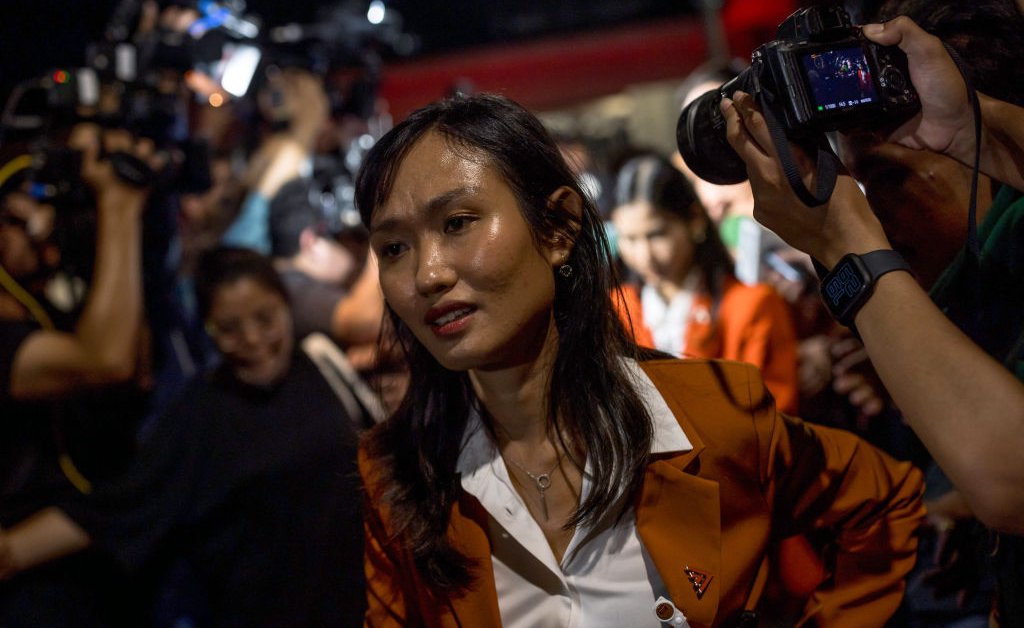
Thai activist-turned-lawmaker Chonthicha “Lookkate” Jangrew—a distinguished determine of the rustic’s pro-democracy motion and a member of the Transfer Ahead Birthday celebration that galvanized the general public all the way through closing 12 months’s parliamentary elections—used to be sentenced on Monday to 2 years in jail for royal defamation associated with her involvement in a 2021 demonstration.
Lookkate, who used to be not too long ago incorporated in TIME’s listing of Subsequent Technology Leaders, which revealed in print additionally on Monday, denies the rate and has filed an enchantment. The court docket has granted her bail till a last determination is made. If the conviction stands, on the other hand, Lookkate can be stripped of her MP standing.
“TIME Mag seems at me like [a] subsequent technology chief looking to exchange the sector,” Lookkate instructed TIME after leaving the court docket in Pathum Thani, a province simply north of Bangkok, on Monday. “However in Thailand, they take a look at me like any individual bad to the society, or a legal—which is actually unhappy.”
Lookkate’s prosecution is the newest blow to the rustic’s pro-democracy motion, which has been rising since a decade in the past when 1000’s of younger protesters took to the streets to name for reform of the rustic’s conservative, royal- and military-linked executive.
“It’s now not simply simplest about my tale, but it surely’s about political activists in Thailand,” Lookkate says, claiming that her criminalization below the rustic’s arguable lese-majeste regulation, which bars grievance of the monarchy, “makes the entire activists really feel unsafe.”
“The lese-majeste conviction towards Ms. Chonthicha, sadly, does now not come as a wonder,” Akarachai Chaimaneekarakate, a consultant from prison advocacy workforce Thai Attorneys for Human Rights (TLHR), tells TIME. “It’s in keeping with Thai courts’ follow of the use of the lese-majeste regulation to silence and punish reputable criticisms of the monarchy.”
In keeping with TLHR, there are round 2,000 individuals who had been prosecuted for political expression since 2020, 272 of whom had been charged with lese-majeste offenses.
Because the protest motion has confronted intense pushback from government through the years, Lookkate is amongst a brand new technology of Thai activists who’ve sought to carry their reform schedule into executive thru politics.�
“I spotted something,” she instructed TIME in an interview in April. “If we need to make a valid, we can’t simplest make exchange in the street. We additionally want to get into energy, and use this energy to make a transformation—to construct a society that we need to see.”
The Transfer Ahead Birthday celebration, which advocated for sweeping exchange, earned a surprise victory closing Might when it emerged as the most important vote-getter in nationwide elections, successful a plurality 151 seats within the 500-member Space of Representatives. However the birthday celebration has since been hampered through political and prison demanding situations—from being blocked from taking the premiership and forming a ruling coalition to the continuing risk of dissolution through the Constitutional Court docket for its efforts to amend the lese-majeste regulation.
In December, Rukchanok Srinok, some other Transfer Ahead lawmaker, used to be sentenced to 6 years in jail for fees together with royal defamation. (She used to be in a similar way granted bail.)
As Thailand’s executive, below High Minister Srettha Thavisin, tries to mission a renewed symbol of political steadiness and financial viability, it has not too long ago made a push for a seat at the United Countries Human Rights Council.
However critics say high-profile circumstances reminiscent of Lookkate’s in addition to that of Netiporn Sanesangkhom—a 28-year-old detained activist who died previous this month after occurring starvation strike to protest the judicial gadget and imprisonment of political dissenters—spotlight the evident inadequacy of the rustic’s human rights document.
“So long as the cost for elementary freedoms are the lives of Thais or their imprisonment,” Akarachai says, “Thailand does now not deserve a seat at the U.N. Human Rights Council.”










